Suchergebnisse für "Factsheet: Energietechnologien gestalten, die für alle sinnvoll und nutzbar sind"
Workshop: Roadmap zur integrierten urbanen Solarenergienutzung
3. Oktober 2016
FH Joanneum, Alte Poststraße 154, 8020 Graz
Bei diesem Stakeholderworkshop wird der Entwurf der Roadmap zur integrierten urbanen Solarenergienutzung vorgestellt. Außerdem erhalten Sie als ExpertInnen die Möglichkeit sich in die Gestaltung der Roadmap einzubringen.
URSOLAR - Optimierung der SOLARenergienutzung in URbanen Energiesystemen
URSOLAR stellt EntscheidungsträgerInnen eine Roadmap zur integrierten urbanen Solarenergie-nutzung zur Verfügung. Es wird aufgezeigt, wie Photovoltaik (PV) und Solarthermie angepasst an infrastrukturelle und rechtliche Gegebenheiten in idealtypischen Stadtquartieren aus ökonomischer, ökologischer und sozialer Sicht sowie unter Berücksichtig von Stakeholder-Interessen optimal ge-nutzt werden können.
PV-Gemeinschaftsanlagen: Sondierung eines partizipativen Pilotprojekts mit Mehrwert in strukturschwachen Städten (MehrWertStrom 2030)
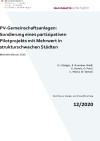
Das Projekt MehrWertStrom 2030 untersuchte die rechtliche, technische, organisatorische und wirtschaftliche Machbarkeit von PV-Gemeinschaftsanlagen auf Mehrparteienhäusern unter Bezugnahme der regionalen Wertschöpfung in strukturschwachen Regionen und erarbeitete neue Lösungsmodelle in Bezug auf Organisation, Finanzierung und Realisierung.
Schriftenreihe
12/2020
O. Schlager, R. Brandner-Weiß, G. Heneis, O. Percl, C. Plöchl, W. Wetzer
Deutsch, 69 Seiten
Downloads zur Publikation
Plug&Play Storage of Photovoltaic Power (P3Power)
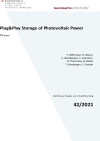
Im Projekt P³Power wird die Messtechnologie NetDetection (Abschätzung des Leistungsverbrauchs an einer Phase von einem beliebigen Messpunkt, z.B. einer Steckdose, in einem Haushalt) entwickelt. Auf Basis dieser Technologie werden plug&play Photovoltaik- und Speichersysteme realisiert, welche 100% Eigennutzung innerhalb beliebiger Aggregationsgrößen - vom Mehrfamilienhaus bis zur Gemeinde - ermöglichen ohne bestehende Installationen adaptieren zu müssen. Die Technologie wird digitalisiert, im Laborumfeld und in Realhaushalten getestet und zu einem umfassenden Energie-Service-Angebot weiterentwickelt.
Schriftenreihe
42/2021
Y. Wittmann, H. Bieser, S. Weinberger, C. Grimmer, B. Thormann, B. Böckl, T. Kienberger, V. Hacker
Herausgeber: BMK
Deutsch, 48 Seiten
Downloads zur Publikation
INN'FIT4UM - Innsbruck "Fit4UrbanMission" - klimaneutrales Innsbruck 2030
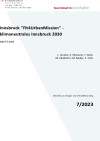
Ziel in INN’F4UM ist es, aufbauend auf einer aktuellen Darstellung der Energie- und Ressourcenflüsse gemeinsam mit der Universität Innsbruck einen Stufenplan zur Erreichung der Klimaneutralität der Stadt bis 2030 zu entwickeln.
Schriftenreihe
7/2023
L. Jänicke, K. Kleewein, Y. Back, M. Kleidorfer, M. Mailer, F. Ochs
Herausgeber: BMK
Deutsch, 39 Seiten
Downloads zur Publikation
Innovationsachse Graz-Gleisdorf (G2G)
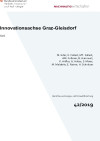
Entwicklung von Test- und Demonstrationsgebieten im Rahmen von ausgewählten Stadt(teil)entwicklungsvorhaben entlang der Innovationsachse Graz-Gleisdorf mit Fokus auf die Bereiche Energie, integrierte Gebäudetechnologien, smarter Stadtraum, kompakte Siedlungsstruktur, Nutzungsmix - Stadt der kurzen Wege, Generationenwohnen, intermodale Mobilität sowie Informations- und Kommunikationstechnologien (IKT).
Schriftenreihe
42/2019
M. Eder, K. Fallast, MT. Fallast, AM. Fulterer, B. Hammerl, K. Höfler, G. Huber, S. Maier, M. Malderle, E. Rainer, H. Schnitzer
Herausgeber: BMVIT
Deutsch, 115 Seiten
Downloads zur Publikation
Innovative Konzepte zur Versorgung großvolumiger städtischer Gebäude/Quartiere mit PV und Geothermie
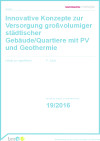
Schriftenreihe
19/2016
F. Zach
Herausgeber: BMVIT
Deutsch, 83 Seiten
Downloads zur Publikation
Energieeffizienz-Potenzial intelligenter Kernverdichtung des urbanen Raums (EPIKUR)
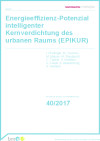
Das gegenständliche Forschungsvorhaben befasste sich mit den Möglichkeiten, Implikationen und Rückkopplungen, die sich durch eine "Stadterweiterung nach innen" mittels innerstädtischer urbaner Verdichtung ergeben. Dabei wurde Nachverdichtung als paradigmenfrei untersucht, d.h. unabhängig von bestehenden Regulativen, sondern anhand des vernünftig machbaren.
Schriftenreihe
40/2017
Herausgeber: BMVIT
Deutsch, 111 Seiten
Downloads zur Publikation
Zertifizierung von Siedlungen / Quartieren
Sondierungsprojekt zur Übertragbarkeit des Schweizer Systems der 2000-Watt Arealbewertung auf Österreich
E_PROFIL - neighborhood profiles for optimized energy transformation processes
E_PROFIL is a set of methods (an IT-supported toolkit) for the elaboration of neighbourhood profiles. The aim of the project is to facilitate an energy and resource efficient development in the planning practice of Austrian cities. Furthermore, the project is an important asset for research and planning activities in Europe and can also be applied to other neighbourhoods.
Green and Resilient City - Management and planning tools for a climate-sensitive urban development
The aim of the project was to provide a "proof of concept" of a control loop and tool set for the management, optimization and evaluation of green and climate-sensitive urban (district) planning- The tool set consist of urban and open space planning instruments as well as climate simulations at different scale levels.
VisErgyControl - Integral control system for daylight and artificial lighting for high visual and melanopic comfort with minimized primary energy consumption
Within the project VisErgyControl an integral, simulation-based, energy-efficient open loop daylight and artificial lighting control system had been developed. The research project focuses on the visual and melanopic requirements of users while minimizing the energy consumption for heating and cooling.
UrbanEnergyCells - Requirements for the implementation of energy cells in future energy system designs
The transformation of the currently hierarchical electricity system into a renewable, decentralized electricity system poses major challenges for the actors in the energy industry and society. Most of the installed decentralized renewable energy sources are installed in rural areas, due to easier legal implementation and shorter decision-making pathways. However, the energy density in urban areas is significantly higher, resulting in a transport of electrical energy to the consumption centers.
Enerspired Cities - open and harmonized infomation basis for energy oriented urban planning
In "Enerspired Cities" the concept for an automized junction of judicial secured access regulation to (geo-)energy data is elaborated. This will be adapted to the specific situations in the cities of Innsbruck, Salzburg and Vienna and implemented in dedicated pilot applications. The declared aim is the support of urban planning, monitoring and research by an easy and transparent access to base data coming from various sources for a wide range of users.
Urban district heating extended – Development of flexible and decarbonized urban district heating systems
Development of innovative urban district heating systems by integration of long-term thermal storage, large scale heat pumps, large scale solar thermal installations, waste heat recovery and analysis and evaluation by simulation. The results of this project will provide templates for technology selection, system design and merit order for new urban district heating areas.
digiactiv - digital transformation for more interactivity in MEP-(mechanical, electrical and plumbing-)planning
The aim of the digiactiv project is to improve the interoperability between the different stakeholders in the building construction sector using open and neutral semantic data models. With digital transformation processes, digiactiv helps to increase the quality of planning and the operation of buildings, as well as to minimize the interface risk between various stakeholders.
KityVR - Artificial intelligence techniques to implement CityGML models and VR visualization
The goal of the project is to link 3D city models and virtual reality for energy-relevant applications as key-enabler for digital planning, construction and operational management. Missing data will be calculated using statistical enrichment methods.
SC_micro-quarters – Planning and modernisation of smart city quarters with a view to energy optimisation and a high quality of life
The SC_micro-quarters project demonstrates possibilities for urban planning and urban quarter development with a view to creating a path to a low carbon city with a high quality of life and good resilience, while taking into account existing and proposed buildings, infrastructures and uses. The central element is the modelling of urban structures at micro-quarter level.
VITALITY District - Optimized energy concepts in the early planning phase of resilient, energy-efficient neighbourhoods
The aim of the VITALITY District project is to coordinate the total (electrical and thermal) load and generation profile in the design phase of urban areas and neighbourhoods in order to optimize the energy concept of energy-efficient districts. Hence smart city indicators in detailed level (buildings, individual technologies, public spaces) as well as models, principles and catalogs of criteria for energy-optimized urban neighbourhoods are going to be created. The results are going to be presented in compact form on the district level in order to serve as input for future urban planning projects.
Stanz+ - An innovative, energy-flexible plus-energy district - the centre of the village Stanz
Stanz+ is working on the implementation of an energy strategy for structurally weak municipalities with specific measures for revitalisation and re-densification in the building stock as well as the integration of renewable energy sources in the municipality of Stanz im Mürztal (Styria). The project includes multipliable approaches towards energy autonomy, hybrid use of energy networks for flexible usage and an energetic revitalisation of the village centre with the involvement of users in the "Rural Pioneers Community" for the usage of energy services.
